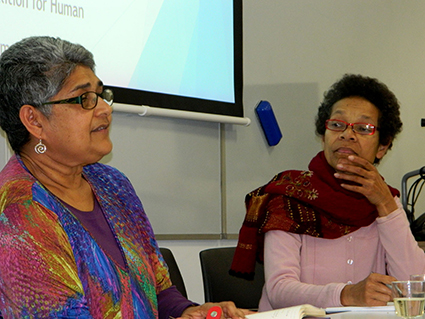
AUCKLAND (Pacific Scoop / Pacific Media Watch): A baffling ballot paper with 249 numbers and no names or party logos, the government using public funds to campaign for the Fiji First party, and a seven-day ban on media – these are just some of the obstacles to a “free and fair” election in Fiji next month.
Asenaca Uluiviti of the Coalition for Democracy in Fiji (CDF), Shamima Ali, chairperson of the Fiji NGO Coalition for Human Rights, and Nik Naidu, spokesperson for the CDF, spoke of these issues at a seminar held at the Auckland University of Technology tonight.
Titled “Fiji’s return to democracy”, the seminar was hosted by the Pacific Media Centre, Asia-Pacific Human Rights Coalition (APHRC) and CDF.
The speakers praised the voter enrolment – with about 580,000 people having registered to vote in the September 17 election, almost 90 percent of all eligible voters have registered to vote.
However, Fiji has had “four and a half” coups since 1987 and Naidu was not optimistic that this pattern would be broken.
“Every time things go wrong for a certain group of people, they entice the military into supporting them and overthrowing elected governments,” Naidu said, predicting that Fiji would continue to have “coup after coup after coup”.
Public funds ‘abused’
Uluiviti said that the government, led by interim Prime Minister Voreqe Bainimarama, who seized power in a coup eight years ago, had embarked on a massive road and bridge building effort in the lead up to the election and accused his administration of “blatant corruption”.
Bainimarama has now stepped down as a rear admiral in the military and is leading the Fiji First party.
It was possible that he was using bridge and road opening ceremonies as campaign platforms for Fiji First, Uluiviti said.
“While they are distracting us with the road building…here is this eight-year-old regime that has willy nilly taken the funds, IMF (International Monetary Fund) loans and has reserved most of its development for this period, so it is campaigning on public funds. To me, that is blatant corruption,” Uluiviti said.
Baffling ballot paper
The ballot paper is a densely packed grid of 249 different numbers and has no party names or logos on it. Voters will have to visit a board outside the polling station and look through the list of candidates, then memorise the number of the candidate they wish to vote for, since it is not permitted to take any notes into the polling station.
Those voters who cannot read and who used to rely on the party logo to mark their cross next to, will be “guided” to the number of their choice on the grid by polling station workers, speakers said.
“It is really stripping the identity of the candidate, the party”, said Uluiviti.
There was “a worry that [polling station workers] would guide people to their own preferred candidate” instead of the voter’s choice, she added. The polling station workers had immunity so could not be “accused of anything”.
Overseas Fijians
There are hundreds of Fiji citizens living in New Zealand who are eligible to vote in the first democratic elections in eight years. However, despite many registration drives only a fraction of Fijians living overseas have registered to vote, reports an Asia-Pacific Journalism reporter, Struan Purdie.
Part of the reason for this, Uluiviti said, was that overseas voters only found out recently that they had to apply to the electoral commission for the right to vote. The application was cumbersome, and Uluiviti – who is based in Auckland – only received her application form on the eve of the last day to apply.
She is still waiting to hear if the electoral commission has approved her as a voter.
“Not many people have exercised that application process. It is almost a deliberate effort to stop us exercising our vote,” Uluiviti said.
Seven-day ban
The media will also face problems over the election period, the speakers said.
There is a seven day ban on media commentary and reportage on the poll for the week prior to the election and on the election day. Overseas journalists who are flying in to Fiji to report on the first democratic election in eight years are concerned about the ban, which carries a $10,000 fine if it is contravened.
It is unclear how the ban will be enforced as bloggers and social media users are unlikely to comply.
“The media is under siege … Journalists are intimidated. The long term effect of official censorship has been profound,” said Ali, who added that the ruling regime had a “revulsion” for the media.
The media was governed by a military decree which left journalists wide open “to the whims of those in power”, she added.
Ali said there was “still some of that robust journalism going on” with some of the media being quite resilient and finding their way around military decrees while others were very weak, and their reporting was “lacklustre”.
One journalist who had posed a tough question to Bainimarama was then grilled on who he was voting for, and was intimidated, Ali recounted.
Voting spread out
Election day is officially September 17 but voting for overseas citizens and people in remote areas in Fiji, doctors, nurses and bus drivers starts on September 3. The speakers voiced concern that this lengthy voting period might lead to vote rigging.
“We don’t know how safe those documents [ballot papers] are going to be and the security and how they will store the voting papers,” Ali said.
“The worry is this is where the rigging will happen,” Uluiviti added.
The governments of Australia and New Zealand were heavily focused on whether the election day seemed “free and fair” instead of looking at the bigger picture, Ali said.
“Everyone wants elections but what happens after is really important,” she said.
A truth and reconciliation commission for victims of torture and state killings and their families was needed.
The NZ and Australian governments would also need to support and train civil servants since the civil service had been hollowed out by Bainimarama’s forced retirement of all public servants over the age of 55.
Civil society organisations, student groups and religious organisations had wanted to set up their own 300-strong joint elections observer group, but were told two months after applying that they would not be allowed to do so since they would be “very biased”.
Other problems included the “draconian section 115″ of the electoral decree, Ali said, which prohibited human rights NGOs from influencing voters in any way.
“It’s a huge obstacle …we should have been able to tell women how to vote, to vote for people who promote human rights,” she said.
Indigenous institutions
The speakers emphasised that if Fiji First did not win a clear majority, this would lead to problems as Bainimarama was not keen on forming a coalition government, especially with any party “that is talking indigenous development, indigenous institutions”, Uluiviti said.
Only seven parties have qualified to take part in the election: Fiji First, Fiji Labour Party, National Federation Party, Peoples’ Democratic Party, One Fiji Party, Social Democratic Liberal Party (SODELPA) and United Freedom Party.
A positive was that most of the parties were led by women and had a strong presence of female candidates, Ali said.
Pacific Scoop Fiji elections coverage
This work is licensed under a Creative Commons Attribution-NonCommercial 3.0 New Zealand Licence.




